It的句型及用法
- 格式:docx
- 大小:36.03 KB
- 文档页数:8
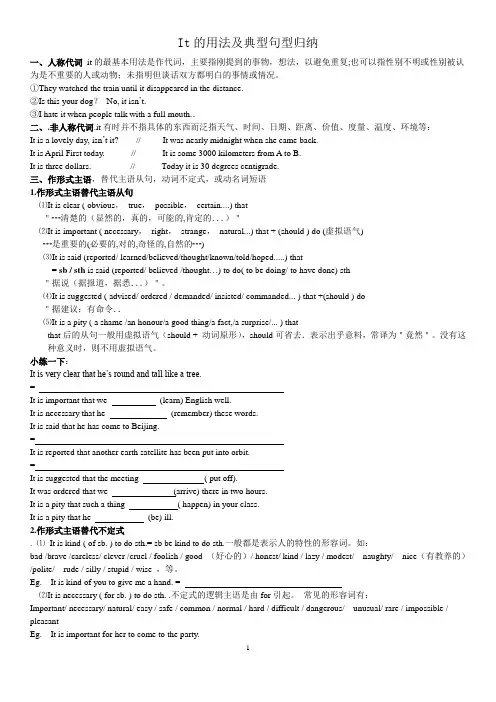
It的用法及典型句型归纳一、人称代词it的最基本用法是作代词,主要指刚提到的事物,想法,以避免重复;也可以指性别不明或性别被认为是不重要的人或动物;未指明但谈话双方都明白的事情或情况。
①They watched the train until it disappeared in the distance.②Is this your dog?No, it isn’t.③I hate it when people talk with a full mouth..二、.非人称代词.it有时并不指具体的东西而泛指天气、时间、日期、距离、价值、度量、温度、环境等:It is a lovely day, isn’t it? // It was nearly midnight when she came back.It is April First today. // It is some 3000 kilometers from A to B.It is three dollars. // Today it is 30 degrees centigrade.三、作形式主语,替代主语从句,动词不定式,或动名词短语1.作形式主语替代主语从句⑴It is clear ( obvious,true,possible,certain....) that"┅清楚的(显然的,真的,可能的,肯定的...)"⑵It is important ( necessary,right,strange,natural...) that + (should ) do (虚拟语气)┅是重要的(必要的,对的,奇怪的,自然的┅)⑶It is said (reported/ learned/believed/thought/known/told/hoped.....) that= sb / sth is said (reported/ believed /thought…) to do( to be doing/ to have done) sth"据说(据报道,据悉...)"。
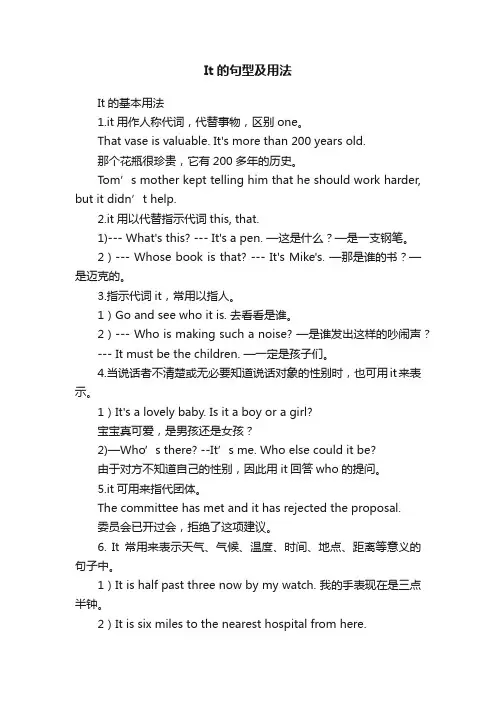
It的句型及用法It的基本用法1.it用作人称代词,代替事物,区别one。
That vase is valuable. It's more than 200 years old.那个花瓶很珍贵,它有200多年的历史。
Tom’s mother kept telling him that he should work harder, but it didn’t help.2.it用以代替指示代词this, that.1)--- What's this? --- It's a pen. —这是什么?—是一支钢笔。
2)--- Whose book is that? --- It's Mike's. —那是谁的书?—是迈克的。
3.指示代词it,常用以指人。
1)Go and see who it is. 去看看是谁。
2)--- Who is making such a noise? —是谁发出这样的吵闹声?--- It must be the children. —一定是孩子们。
4.当说话者不清楚或无必要知道说话对象的性别时,也可用it来表示。
1)It's a lovely baby. Is it a boy or a girl?宝宝真可爱,是男孩还是女孩?2)—Who’s there? --It’s me. Who else could it be?由于对方不知道自己的性别,因此用it回答who的提问。
5.it可用来指代团体。
The committee has met and it has rejected the proposal.委员会已开过会,拒绝了这项建议。
6. It常用来表示天气、气候、温度、时间、地点、距离等意义的句子中。
1)It is half past three now by my watch. 我的手表现在是三点半钟。
2)It is six miles to the nearest hospital from here.这里离最近的医院也有六英里。
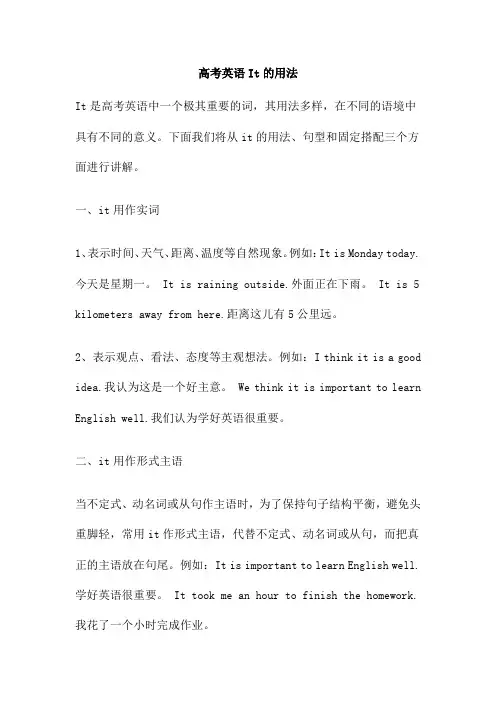
高考英语It的用法It是高考英语中一个极其重要的词,其用法多样,在不同的语境中具有不同的意义。
下面我们将从it的用法、句型和固定搭配三个方面进行讲解。
一、it用作实词1、表示时间、天气、距离、温度等自然现象。
例如:It is Monday today.今天是星期一。
It is raining outside.外面正在下雨。
It is 5 kilometers away from here.距离这儿有5公里远。
2、表示观点、看法、态度等主观想法。
例如:I think it is a good idea.我认为这是一个好主意。
We think it is important to learn English well.我们认为学好英语很重要。
二、it用作形式主语当不定式、动名词或从句作主语时,为了保持句子结构平衡,避免头重脚轻,常用it作形式主语,代替不定式、动名词或从句,而把真正的主语放在句尾。
例如:It is important to learn English well.学好英语很重要。
It took me an hour to finish the homework.我花了一个小时完成作业。
三、it用作形式宾语当不定式、动名词或从句作宾语时,为了保持句子结构平衡,避免头重脚轻,常用it作形式宾语,代替不定式、动名词或从句,而把真正的宾语放在句尾。
例如:I think it is important to learn English well.我认为学好英语很重要。
He found it hard to learn English well.他发现学好英语很难。
四、it用于强调句型中强调句型是英语中一个重要的句型,用于突出强调某个成分,特别是主语、宾语和状语等。
在强调句型中,it没有实际意义,只是起到引导作用。
例如:It is I who am the best student in my class.我是班里最好的学生。
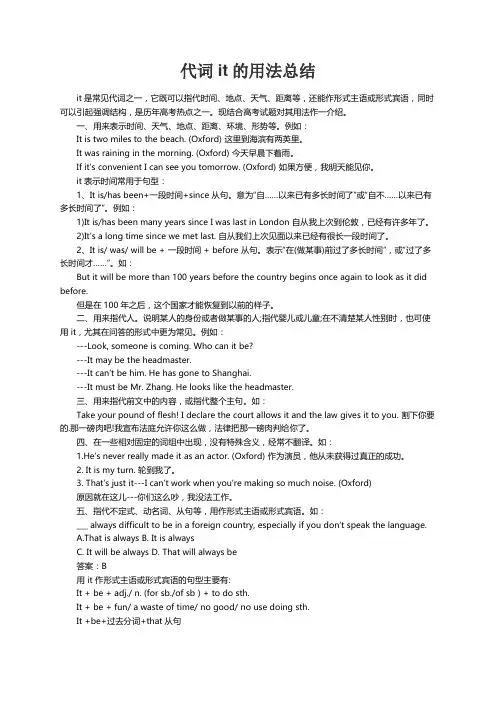
代词it的用法总结it是常见代词之一,它既可以指代时间、地点、天气、距离等,还能作形式主语或形式宾语,同时可以引起强调结构,是历年高考热点之一。
现结合高考试题对其用法作一介绍。
一、用来表示时间、天气、地点、距离、环境、形势等。
例如:It is two miles to the beach. (Oxford) 这里到海滨有两英里。
It was raining in the morning. (Oxford) 今天早晨下着雨。
If it’s convenient I can see you tomorrow. (Oxford) 如果方便,我明天能见你。
it表示时间常用于句型:1、It is/has been+一段时间+since 从句。
意为“自……以来已有多长时间了”或“自不……以来已有多长时间了”。
例如:1)It is/has been many years since I was last in London 自从我上次到伦敦,已经有许多年了。
2)It’s a long time since we met last. 自从我们上次见面以来已经有很长一段时间了。
2、It is/ was/ will be + 一段时间 + before 从句。
表示“在(做某事)前过了多长时间”,或“过了多长时间才……”。
如:But it will be more than 100 years before the country begins once again to look as it did before.但是在100年之后,这个国家才能恢复到以前的样子。
二、用来指代人。
说明某人的身份或者做某事的人;指代婴儿或儿童;在不清楚某人性别时,也可使用 it,尤其在问答的形式中更为常见。
例如:---Look, someone is coming. Who can it be?---It may be the headmaster.---It can’t be him. He has gone to Shanghai.---It must be Mr. Zhang. He looks like the headmaster.三、用来指代前文中的内容,或指代整个主句。

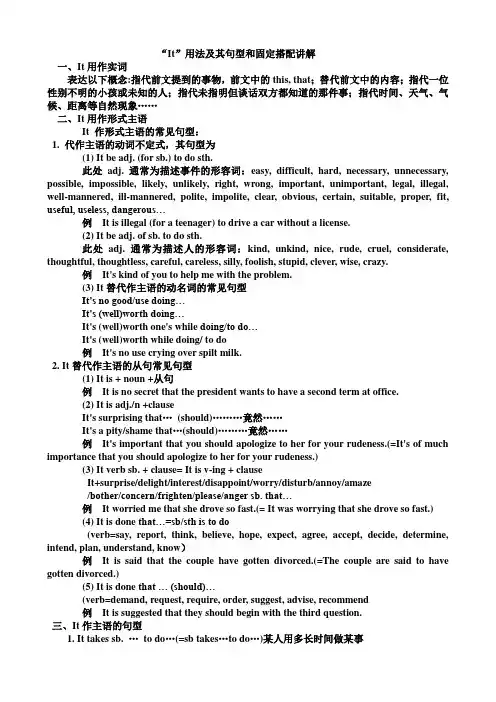
“It”用法及其句型和固定搭配讲解一、It用作实词表达以下概念:指代前文提到的事物,前文中的this, that;替代前文中的内容;指代一位性别不明的小孩或未知的人;指代未指明但谈话双方都知道的那件事;指代时间、天气、气候、距离等自然现象……二、It用作形式主语It 作形式主语的常见句型:1. 代作主语的动词不定式,其句型为(1) It be adj. (for sb.) to do sth.此处adj. 通常为描述事件的形容词:easy, difficult, hard, necessary, unnecessary, possible, impossible, likely, unlikely, right, wrong, important, unimportant, legal, illegal, well-mannered, ill-mannered, polite, impolite, clear, obvious, certain, suitable, proper, fit, useful, useless, dangerous…例It is illegal (for a teenager) to drive a car without a license.(2) It be adj. of sb. to do sth.此处adj. 通常为描述人的形容词:kind, unkind, nice, rude, cruel, considerate, thoughtful, thoughtless, careful, careless, silly, foolish, stupid, clever, wise, crazy.例It's kind of you to help me with the problem.(3) It替代作主语的动名词的常见句型It's no good/use doing…It's (well)worth doing…It's (well)worth one's while doing/to do…It's (well)worth while doing/ to do例It's no use crying over spilt milk.2. It替代作主语的从句常见句型(1) It is + noun +从句例It is no secret that the president wants to have a second term at office.(2) It is adj./n +clauseIt's surprising that…(should)………竟然……It's a pity/shame that…(should)………竟然……例It's important that you should apologize to her for your rudeness.(=It's of much importance that you should apologize to her for your rudeness.)(3) It verb sb. + clause= It is v-ing + clauseIt+surprise/delight/interest/disappoint/worry/disturb/annoy/amaze/bother/concern/frighten/please/anger sb. that…例It worried me that she drove so fast.(= It was worrying that she drove so fast.)(4) It is done that…=sb/sth is to do(verb=say, report, think, believe, hope, expect, agree, accept, decide, determine, intend, plan, understand, know)例It is said that the couple have gotten divorced.(=The couple are said to have gotten divorced.)(5) It is done that … (should)…(verb=demand, request, require, order, suggest, advise, recommend例It is suggested that they should begin with the third question.三、It作主语的句型1. It takes sb. …to do…(=sb takes…to do…)某人用多长时间做某事例It took the men a week to mend our roof.(= The men took a week to mend our roof.)2. It's (about/high) time that…should /v-ed…是该做某事的时候了例It's(about/high) time that we should take action.3. It's the x-th time (that) …have v-ed…第几次做某事了例It's the third time that he has failed the driving test.4. It is/has been…since …continuous v-ed(延续性动词) 某动作已有多长时间不发生了例It's 10 years that he lived here6. It was(not)…before…过(不)了多长时间某动作发生了例It was not long before they arrived.四、It 作形式宾语It 作形式宾语的常见句型:1. verb+ it+ adj./noun (for/of) to do/clause (verb=think, believe, suppose, consider, feel, make, keep…)例I think it hard for you to do the task on your own./I think it hard that you'll do the task on your own.2. v. +it + prep. + that…owe it to sb. that…把…归功于…leave it to sb that…把…留给某人去做take it for granted that …想当然keep it i n mind that…例Don't bother to arrange anything. Just leave it to me to sort out.3. It用在不能直接跟宾语从句的动词后面,尤其是表示好恶的动词后,enjoy, like, love, dislike, resent, hate, don't mind, be fond of, feel like, see to 宾语从句紧跟it之后例I hate it you can swim so well and I can't.五、强调句型It is/was+被强调部分+ that(who)…强调句型用来强调谓语动词以外的任何句子成分。
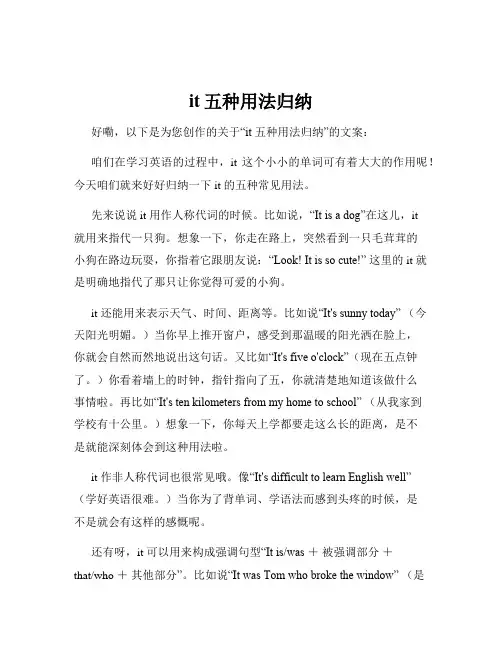
it五种用法归纳好嘞,以下是为您创作的关于“it 五种用法归纳”的文案:咱们在学习英语的过程中,it 这个小小的单词可有着大大的作用呢!今天咱们就来好好归纳一下 it 的五种常见用法。
先来说说 it 用作人称代词的时候。
比如说,“It is a dog”在这儿,it就用来指代一只狗。
想象一下,你走在路上,突然看到一只毛茸茸的小狗在路边玩耍,你指着它跟朋友说:“Look! It is so cute!” 这里的 it 就是明确地指代了那只让你觉得可爱的小狗。
it 还能用来表示天气、时间、距离等。
比如说“It's sunny today” (今天阳光明媚。
)当你早上推开窗户,感受到那温暖的阳光洒在脸上,你就会自然而然地说出这句话。
又比如“It's five o'clock”(现在五点钟了。
)你看着墙上的时钟,指针指向了五,你就清楚地知道该做什么事情啦。
再比如“It's ten kilometers from my home to school” (从我家到学校有十公里。
)想象一下,你每天上学都要走这么长的距离,是不是就能深刻体会到这种用法啦。
it 作非人称代词也很常见哦。
像“It's difficult to learn English well”(学好英语很难。
)当你为了背单词、学语法而感到头疼的时候,是不是就会有这样的感慨呢。
还有呀,it 可以用来构成强调句型“It is/was +被强调部分+that/who +其他部分”。
比如说“It was Tom who broke the window” (是汤姆打破了窗户。
)就好像你在教室里,突然听到玻璃破碎的声音,大家都在猜测是谁干的,最后发现是汤姆,这时候强调句型就能很好地表达出来啦。
最后,it 还能用于某些固定句型中,比如“make it”(成功;做到)。
当你一直努力准备考试,最后终于取得了好成绩,你就可以骄傲地说:“I made it!” (我做到了!)总之,it 的用法多种多样,咱们在学习的过程中要多留意、多练习,这样才能熟练掌握。
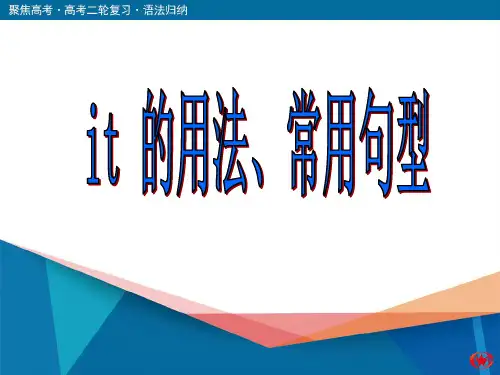


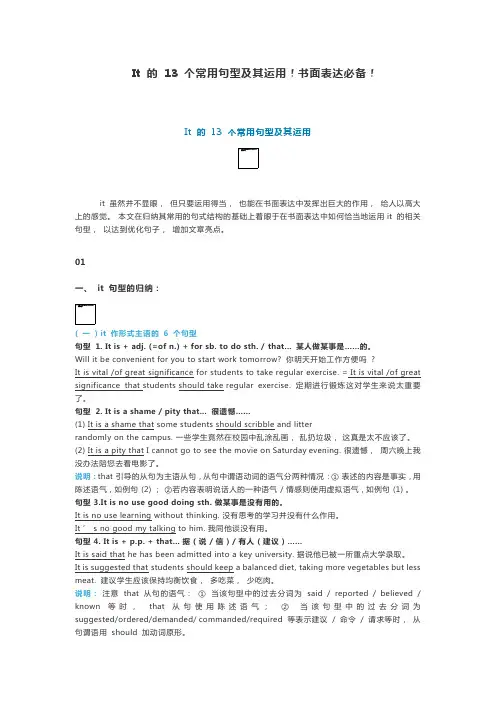
It 的13 个常用句型及其运用!书面表达必备!It 的13 个常用句型及其运用it 虽然并不显眼,但只要运用得当,也能在书面表达中发挥出巨大的作用,给人以高大上的感觉。
本文在归纳其常用的句式结构的基础上着眼于在书面表达中如何恰当地运用it 的相关句型,以达到优化句子,增加文章亮点。
01一、it 句型的归纳:( 一) it 作形式主语的 6 个句型句型1. It is + adj. (=of n.) + for sb. to do sth. / that... 某人做某事是……的。
Will it be convenient for you to start work tomorrow? 你明天开始工作方便吗?It is vital /of great significance for students to take regular exercise. = It is vital /of great significance that students should take regular exercise. 定期进行锻炼这对学生来说太重要了。
句型2. It is a shame / pity that... 很遗憾……(1) It is a shame that some students should scribble and litterrandomly on the campus. 一些学生竟然在校园中乱涂乱画,乱扔垃圾,这真是太不应该了。
(2) It is a pity that I cannot go to see the movie on Saturday evening. 很遗憾,周六晚上我没办法陪您去看电影了。
说明: that 引导的从句为主语从句,从句中谓语动词的语气分两种情况:①表述的内容是事实,用陈述语气 , 如例句 (2) ;②若内容表明说话人的一种语气 / 情感则使用虚拟语气 , 如例句 (1) 。
it的用法总结经典句型1. “It’s time to do something”(是做某事的时候了)。
比如说:“It’s time to hit the sack!(是该睡觉的时候啦!)”,这就像是火车到了站点,该行动啦!2. “It takes somebody some time to do something”(某人花费多少时间做某事)。
像“ It took her a whole day to finish that painting.(她花了一整天来完成那幅画。
)”,就好像爬山一样,得一步步花费力气上去呀。
3. “It seems that...”(似乎……)。
比如“ It seems that he is angry.(似乎他生气了。
)”,这就如同天空的云,好像是某种形状,但又不是那么确定。
4. “It is said that...”(据说……)。
像“ It is said that there is a monster in that lake.(据说那个湖里有个怪物。
)”,就好像是流传的神秘故事一样吸引人。
5. “Make it +形容词”(使它变得……)。
例如“Let’s make it interesting.(让我们使它变得有趣。
)”,是不是如同给一幅画上色,让它鲜活起来呢?6. “Find it +形容词to do something”(发现做某事是……的)。
像“ I find it difficult to learn this language.(我发现学习这门语言很难。
)”,这和走一条崎岖的路一样,能感受到其中的不容易啊。
我的观点结论:掌握这些关于 it 的经典句型就如同拥有了一把钥匙,可以打开英语表达的各种奇妙之门,让我们在英语的世界里更加自如地交流和表达呀!。
---------------------------------------------------------------最新资料推荐------------------------------------------------------It的用法(超全)用法及其句型和固定搭配,是英语语法的重点、难点,又是近几年考试的热点,因此在复习中应给予足够的重视。
句型归纳:1. It is +adj.(+for sb./sth.) + to do sth.用于此句型的形容词有:easy, hard, difficult,possible, important, impossible,necessary, good, bad, exciting, interesting, surprising 等。
如:It is necessary to change your job. It was very hard for them to walk such a long way in the snow. 2.It is +n.(+for sb./sth.) + to do sth.用于此句型的名词有:pity, shame, pleasure, ones duty, ones job, fun, joy, good manners, bad manners 等。
如:It is a pity for you to have missed such a wonderful play. It is bad manners for the young to take up the seats for the old. 3.It is +adj.+of sb.+to do sth.此句型中的形容词主要描述某人的品德、特征。
能用于该句型的形容词有:1 / 13kind, nice, wise, silly, polite, impolite, friendly, foolish, clever 等。
“It”的用法及其句型详解“It”用法及其句型和固定搭配,是高中英语语法的重点、难点,又是近几年高考的热点,因此应给予充分的重视,现将it用法归纳如下:一、It用作实词表达以下概念:指代前文提到的事物,前文中的this,that;替代前文中的内容;指代一位性别不明的小孩或未知的人;指代未指明但谈话双方都知道的那件事;指代时间、天气、气候、距离等自然现象……二、It用作形式主语替代作主语的从句、动词不定式、动名词,而把真正作主语的从句、动词不定式、动名词置于句尾。
It 作形式主语的常见句型:1. 代作主语的动词不定式,其句型为(1)It be adj.(for sb.)to do sth.此处adj. 通常为描述事件的形容词:easy,difficult,hard,necessary,unnecessary,possible,impossible,likely,unlikely,right,wrong,important,unimportant,legal,illegal,well-mannered,ill-mannered,polite,impolite,clear,obvious,certain,suitable,proper,fit,useful,useless,dangerous…例It is illegal(for a teenager)to drive a car without a license.(2)It be adj. of sb. to do sth.此处adj. 通常为描述人的形容词:kind,unkind,nice,rude,cruel,considerate,thoughtful,thoughtless,careful,careless,silly,foolish,stupid,clever,wise,crazy.例It's kind of you to help me with the problem.(3)It替代作主语的动名词的常见句型It's no good/use doing…It's(well)worth doing…It's(well)worth one's while doing/to do…It's(well)worth while doing/ to do例It's no use crying over spilt milk.2. It替代作主语的从句常见句型(1)It is + noun +从句例It is no secret that the president wants to have a second term at office.(2)It is adj. +clauseIt's surprising that…(should)………竟然……It's a pity/shame that…(should)………竟然……例It's important that you should apologize to her for your rudeness.(=It's of much importance that you should apologize to her for your rudeness.)(3)It verb sb. + clause= It is v-ing + clauseIt+surprise/delight/interest/disappoint/worry/disturb/annoy/amaze/bother/concern/frighten/please/anger sb. that…例It worried me that she drove so fast.(= It was worrying that she drove so fast.)(4)It verb(to sb.)that…= sb/sth verb to do(verb = appear,seem,come about,emerge,follow,chance,happen,occur,transpire,turn out ,work out)例It(so)happened/chanced that they were out.(= They happened/chanced to be out.)(5)It is v-ed that…=sb/sth is to do(verb=say,report,think,believe,hope,expect,agree,accept,decide,determine,intend,plan,understand,know)例It is said that the couple have gotten divorced.(=The couple are said to have gotten divorced.)(6)It is v-ed that …(should)…(verb=demand,request,require,order,suggest,advise,recommend例It is suggested that they should begin with the third question.“It”用法及其句型和固定搭配讲解2007-05-01 17:14:05.0中国高中生网()三、It作主语的句型1. It takes sb. …to do…(=sb takes…to do…)某人用多长时间做某事例It took the men a week to mend our roof.(= The men took a week to mendour roof.)2. It's(just)(un)like sb. to do…(不)像某人做某事的风格例It was(just)like him to think of helping us.3. It's(about/high)time that…should /v-ed…是该做某事的时候了例It's(about/high)time that we should take action.4. It's the x-th time(that)…have v-ed…第几次做某事了例It's the third time that he has failed the driving test.5. It is/has been…since …continuous v-ed(延续性动词)某动作已有多长时间不发生了例It's 10 years that he lived here6. It was(not)…before…过(不)了多长时间某动作发生了例It was not long before they arrived.四、It 作形式宾语用来替代作宾语的从句、动词不定式、动名词,而把真正作宾语的从句、动词不定式、动名词置于句尾。
It的基本用法1.it用作人称代词,代替事物,区别one。
That vase is valuable. It's more than 200 years old.那个花瓶很珍贵,它有200多年的历史。
Tom’s mother kept telling him that he should work harder, but it didn’t help.2.it用以代替指示代词this, that.1)--- What's this? --- It's a pen. —这是什么?—是一支钢笔。
2)--- Whose book is that? --- It's Mike's. —那是谁的书?—是迈克的。
3.指示代词it,常用以指人。
1)Go and see who it is. 去看看是谁。
2)--- Who is making such a noise? —是谁发出这样的吵闹声?--- It must be the children. —一定是孩子们。
4.当说话者不清楚或无必要知道说话对象的性别时,也可用it来表示。
1)It's a lovely baby. Is it a boy or a girl?宝宝真可爱,是男孩还是女孩?2)—Who’s there? --It’s me. Who else could it be?由于对方不知道自己的性别,因此用it回答who的提问。
5.it可用来指代团体。
The committee has met and it has rejected the proposal.委员会已开过会,拒绝了这项建议。
6. It常用来表示天气、气候、温度、时间、地点、距离等意义的句子中。
1)It is half past three now by my watch. 我的手表现在是三点半钟。
2)It is six miles to the nearest hospital from here.这里离最近的医院也有六英里。
3)It was very cold; it snowed and grew dark.天气很冷;下着雪,渐渐地变黑了。
7.it也常用来表示一般的笼统的情况。
How is it going with you?你近况如何?8.it也常用于下列结构:1)It looks as if the college is very small. 看起来这个学院很小。
2)It seems as though our plan will be perfect. 似乎我们的计划很完善。
3)It's my turn. 该轮到我了。
9. it也常用于某些习惯用语中作宾语,各个习惯用语有具体意义,但it并无具体意义。
Forget it不必在意,算了make it +时间把时间定在某时take it easy 别着急,慢慢来take it that… 认为come to it确保put it that.. 表达\写到\说到see to it that 注意使……务必使……1)—Could we see each other at 3 o’clock this afternoon?--Sorry, Let’s make it another time.(咱们另约时间吧)2)Please see to it that you get here on time tomorrow morning.请务必明天早上准时到这。
10. it用作形式主语1)It is difficult to translate this article. 翻译这篇文章很难。
2)What time would it be most convenient for me to call again?什么时候我再给你打电话最合适?3)It is no use going there so early. 这么早去那里没有用。
4)It has been a great honor your coming to visit me.你的来访是我很大的荣幸。
5)It is strange that he did not come at all. 真奇怪,他竟还没来。
6)It seems that John is not coming after all. 似乎约翰终竟不来。
7)It happened that John was the only witness. 碰巧约翰是唯一的证人。
11. 用作形式宾语(6123结构:6是指用于这个结构的6个常用的及物动词think,find,make,feel,believe,consider;1指形式宾语it;2指作宾语的名词和形容词;3是指作真正宾语的三种形式:动词不定式短语、动名词短语、that引导的宾语从)1)I found it difficult to explain to him what happened.我觉得向他解释清发生了什么事很困难。
2)He thought it no use going over the subject again.他认为再讨论这个问题没有用了。
3)They kept it quiet that he was dead. 他们对他的死保密。
4)We must make it clear to the public that something should be done to stop pollution.我们必须使公众明白应该采取措施制止污染。
12. 在英语中,有些动词(短语)不能直接跟宾语从句,须先接形式宾语it作形式宾语,然后再把真正的宾语置后。
常用的动词有appreciate“感激”,dislike“不喜欢”,hate “恨”,like“喜欢”,love“爱”,enjoy,prefer, take,depend on “依靠” ask for(要求),insist on(坚持),see to(负责,确保)take …for granted(认为…理所当然)等1) I hate it when people talk with their mouths full. 我讨厌人们满嘴食物讲话。
2) I would appreciate it if you could come to my birthday party.3) She’ll answer for it that he passes the exam. 她将负责他通过考试这件事。
4) Will you see to it that the luggage is brought back as soon as possible?你能确保把行李尽快带回来吗?It 的20个句型详解根据it的用法特点可归纳为20个句型1. It is\was + 被强调部分+ that …该句型是强调句型。
将被强调的部分放在前面,其它部分置于that之后。
被强调部分可以是主语,宾语,表语或状语。
强调的主语如果是人,that可以由who换用。
如果把这种句型结构划掉后,应该是一个完整无缺的句子。
这也是判断强调句型与其它从句的方法。
I met my old friend in the street yesterday.It was I who\that met my old friend in the street yesterday.It was in the street that I met my old friend yesterday.It was my old friend that I met in the street yesterday.It was yesterday that I met my old friend in the street.2. It is\was not until + 被强调部分+ that …该句型也是强调句型。
主要用于强调时间状语,译成汉语“直到…才…”,可以说是not …until …的强调形式。
It was not until she took off her dark glasses that I realized she was a famous film star.= Not until she took off her dark glasses did I realize she was a famous film star.= I didn't realize she was a famous film star until she took off her dark glasses.3. It is clear (obvious, true, possible, ce rtain…)that …该句型中it 是形式主语,真正的主语是that 引导的主语从句,常译为“清楚(显然,真的,肯定…)”是主语从句最常见的一种结构。
It is very clear that he tells lies. = That he tells lies is very clear.4. It is important (necessary, right, strange, natural…)that …该句型和上一个同属一个句型。
由于主句中的形容词不同,that 后的从句中要用虚拟语气(should + 动词原形),should 可以省去。
建议记住该句型中的形容词。
It is important that we (should)learn English well.It is necessary that he (should)remember these words.5. It is said (reported, learned…)that …该句型中的it 仍是形式主语,真正主语是that 引导的主语从句。
该结构常译为“据说(据报道,据悉…)”。
It is said that he has come to Beijing.It is reported that the temperature will decline sharply in one or two days.(据报道气温近日将明显下降。
)6. It is suggested (ordered … )that …该句型和上一个同属一个句型。
主句中的过去分词是表示请求,建议,命令等词时,that后的从句要用虚拟语气(should + 动词原形),should 可以省。
常译为“据建议;有命令…)It is suggested that the meeting (should )be put off.It was ordered that we (should )arrive there in two hours.7. It is a pity (a shame … )that …该句型中,that后的从句一般用虚拟语气(should + 动词原形),should可省去。